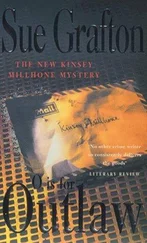"You want a drink?"
"I don't dare. I couldn't stop. They'd have to check me into detox."
"Has he always been like that?"
Henry nodded bleakly. "I never really saw it till now. Or maybe in his dotage he's become decidedly worse. I remember, as a kid, he had all these accidents. He tumbled out of trees and fell off swings. He broke his arm once. He broke a wrist. He stuck a pencil in his eye and nearly blinded himself. And the cuts. Oh my God, you couldn't let him near a knife. He had all kinds of allergies and weird things going wrong with him. He had a spastic salivary gland… he really did. Later, he went through a ten-year period when he had all his internal organs taken out. Tonsils and adenoids, appendix, his gallbladder, one kidney, two and a half feet from his upper intestine. The man even managed to rupture his spleen. Out it came. We could have constructed an entire human being out of the parts he gave up."
I glanced up to find Rosie standing at my shoulder, taking in Henry's outburst with a placid expression. "He's having a breakdown?"
"His brother's visiting from Michigan."
"He don' like the guy?"
"The man is driving him nuts. He's a hypochondriac."
She turned to Henry with interest. "What's the matter with him? Is he sick?"
"No, he's not sick. He's neurotic as hell."
"Bring him in. I fix. Nothing to it."
"I don't think you quite understand the magnitude of the problem," I said.
"Is no problem. I can handle it. What's the fellow's name, this brother?"
"His name is William."
Rosie said "William" as she wrote it in her little notebook. "Is done. I fix. Not to worry."
She moved away from the table, her muumuu billowing out around her like a witch's cape.
"Is it my imagination or has her English gotten worse lately?" I asked.
Henry looked up at me with a wan smile.
I gave his hand a maternal pat. "Cheer up. Is done. Not to worry. She'll fix."
I was home by 10:00, but I didn't feel like continuing my cleaning campaign. I took my shoes off and used my dirty socks to do a halfhearted dusting of the spiral staircase as I went up to bed. Works for me, I thought.
I was awakened in the wee hours with a telegram from my subconscious. "Pickup," the message read. Pickup what? My eyes came open and I stared at the skylight above my bed. The loft was very dark. The stars were blocked out by clouds, but the glass dome seemed to glow with light pollution from town. The message had to be related to Tippy's presence at the intersection. I'd been brooding about the subject since David Barney first brought it up. If he was inventing, why attach her name to the story? She might have had a ready explanation for where she was that night. If he was lying about the incident, why take the chance? The repair crew had seen her, too… well, not really her, but the pickup. Where else had I come across mention of a pickup truck? I sat up in bed, pushed the covers back, and flipped on the light, wincing at the sudden glare. In lieu of a bathrobe, I pulled on my sweats. Barefoot, I padded down my spiral staircase, turned on the table lamp, and hunted up my briefcase, sorting through the stack of folders I'd brought home from the office. I found the file I was looking for and carried it over to the sofa, where I sat, feet tucked up under me, leafing through old photocopies of the Santa Teresa Dispatch. For the third time in two days, I scanned column after column of smudgy print. Nothing for the twenty-fifth. Ah. On the front page of the local news for December 26 was the little article I'd seen about the hit-and-run fatality of an elderly man, who'd wandered away from a convalescent hospital in the neighborhood. He'd been struck by a pickup truck on upper State Street and had died at the scene. The name of the victim was being withheld, pending notification of his next of kin. Unfortunately, I hadn't made copies of the newspapers for the week after that so I couldn't read the follow-up.
I pulled out the telephone book and checked the yellow pages under Convalescent Homes amp; Hospitals. The sublistings were Homes, Hospitals, Nursing Homes, Rest Homes, and Sanitariums, most of which simply cross-referenced each other. Finally, under Nursing Homes, I found a comprehensive list. There was only one such facility in the vicinity of the accident. I made a note of the address and then turned the lights out and went back up to bed. If I could link that pickup to the one Tippy's father owned, it might go a long way toward explaining why she was reluctant to admit she was out. It would also verify every word David Barney'd said.
In the morning, after my usual three-mile run, a shower, breakfast, and a quick call to the office, I drove out to the South Rockingham neighborhood where the old man had been killed. At the turn of the century, South Rockingham was all ranchland, flat fields planted to beans and walnuts, harvested by itinerant crews who traveled with steam engines, cookhouses, and bedroll wagons. An early photograph shows some thirty hands lined up in front of their cumbersome, clanking machinery. Most of the men are mustachioed and glum, wearing bandannas, long-sleeved shirts, overalls, and felt hats. Staunchly they lean on their pitchforks while a dusty noon sun beats down. The land in such pictures always looks pitiless and flat. There are few trees and the grass, if it grows at all, seems patchy and sparse. Later aerial photos show the streets radiating from a round hub of land, like the spokes of a wagon wheel. Beyond the outermost rim, the squares of young citrus groves are pieced together like a quilt. Now South Rockingham is a middle-class neighborhood of modest custom-built homes, half of which went up before 1940. The balance were constructed during a miniboom in the ten years between 1955 and 1965. Every parcel is dense with vegetation, houses crowded onto every available lot. Still, the area is considered desirable because it's quiet, self-contained, attractive, and well kept.
I located the convalescent hospital, a one-story stucco structure flanked on three sides by parking lots. From the outside, the fifty-bed facility looked plain and clean, probably expensive. I parked at the curb and climbed four concrete steps to the sloping front walk. The grass on either side was in its dormant stage, clipped short, a mottled yellow. An American flag hung limply from a pole near the entrance.
I pushed through a wide door into a comfortably furnished reception area, decorated in the style of one of the better motel chains. Christmas hadn't surfaced yet. The color scheme was pleasant: blues and greens in soothing, noninflammatory shades. There was a couch covered in chintz and four matching upholstered chairs arranged so as to suggest intimate lobby chats. The magazines on the end tables were neatly fanned out in an arc of overlapping titles, Modern Maturity being foremost. There were two ficus trees, which on closer inspection turned out to be artificial. Both might have used a dusting, but at least they weren't subject to whitefly and blight.
At the desk, I asked to see the nursing home director and was directed to the office of a Mr. Hugo, halfway down the corridor to my left. This wing of the building was strictly administrative. There were no patients in evidence, no wheelchairs, gurneys, or medical paraphernalia. The very air was stripped of institutional odors. I explained my business briefly, and after a five-minute wait Mr. Hugo's personal secretary ushered me into his office. Nursing home directors must have a lot of holes to fill in their appointment books.
Edward Hugo was a black man in his midsixties with a curly mix of gray and white hair and a wide white mustache. His complexion was glossy brown, the color of caramel. The lines in his face suggested an origami paper folded once, then flattened out again. He was conventionally dressed, but something in his manner hinted at obligatory black-tie appearances for local charity events. He shook my hand across his desk and then took his seat again while I took mine. He folded his hands in front of him on the desk. "What can I help you with?"
Читать дальше











